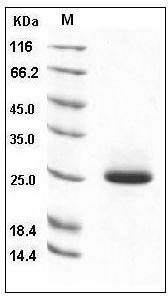-
Product Name
Mouse LCN2/NGAL (His Tag) recombinant protein
- Documents
-
Description
Iron-trafficking protein involved in multiple processes such as apoptosis, innate immunity and renal development. Binds iron through association with 2,5-dihydroxybenzoic acid (2,5-DHBA), a siderophore that shares structural similarities with bacterial enterobactin, and delivers or removes iron from the cell, depending on the context. Iron-bound form (holo-24p3) is internalized following binding to the SLC22A17 (24p3R) receptor, leading to release of iron and subsequent increase of intracellular iron concentration. In contrast, association of the iron-free form (apo-24p3) with the SLC22A17 (24p3R) receptor is followed by association with an intracellular siderophore, iron chelation and iron transfer to the extracellular medium, thereby reducing intracellular iron concentration. Involved in apoptosis due to interleukin-3 (IL3) deprivation: iron-loaded form increases intracellular iron concentration without promoting apoptosis, while iron-free form decreases intracellular iron levels, inducing expression of the proapoptotic protein BCL2L11/BIM, resulting in apoptosis. Involved in innate immunity, possibly by sequestrating iron, leading to limit bacterial growth.
-
Protein name
Neutrophil gelatinase-associated lipocalin
-
Protein short names
SIP24; MSFI; 24P3; AW212229; NGAL; RP23-161B9.11; LCN2
-
Uniprot ID
P11672
-
Gene Name
Lcn2
-
Source/Expression Host
Human Cells
-
Expression Plasmid/cDNA
A DNA sequence encoding the mouse LCN2 (NP_032517.1) precursor (Met 1-Asn 200) was expressed with a C-terminal polyhistidine tag.
-
Protein Species
Mouse
-
Molecular weight
The secreted recombinant mouse LCN2 consists of 191 amino acids and has a calculated molecular mass of 22.3 kDa. As a result of glycosylation, the recombinant protein migrates as an approximately 25 kDa protein in SDS-PAGE under reducing conditions.
-
Purity
> 97 % as determined by SDS-PAGE
-
Activity
Measured by its ability to bind Iron(III) dihydroxybenzoic acid [Fe(DHBA)3]. The binding of Fe(DHBA)3 results in the quenching of Trp fluorescence in recombinant mouse Lipocalin-2. Recombinant mouse Lipocalin-2 can bind >1.0 μM of Fe(DHBA)3.
-
Validations

Mouse LCN2 / NGAL Protein (His Tag) SDS-PAGE
Related Products / Services
Please note: All products are "FOR RESEARCH USE ONLY AND ARE NOT INTENDED FOR DIAGNOSTIC OR THERAPEUTIC USE"
